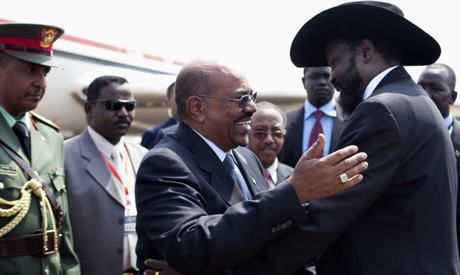
South Sudan's President Salva Kiir welcomes Sudan's President Omar Hassan al-Bashir at Juba airport (photo: Reuters)
Mausoleum in their capital, Juba yesterday, replacing the Sudanese flag in a symbolic act that declared the Republic of South Sudan an independent state. The state of North Sudan was quick to recognise the nascent country on the eve of the declaration of independence, as did Egypt - and most of the world community - as soon as it was born.
Masses of southern citizens, estimated at two million, and a large number of international representatives and organisations were in attendance.
Silva Kiir Maraydit was sworn in as the president of the Republic of South Sudan and signed the constitution passed by the South’s parliament. This came after a sleepless night of non-stop revelling in street festivals in Juba, celebrating the arrival of this momentous day in their history.
During the swearing-in ceremony, President Mayardit promised to carry out his duties honestly and democratically in order to achieve development and prosperity for the people of the South, that he will work to embed the values of democracy and wise rule and maintain the unity and dignity of the people of the South.
South Sudan’s Parliament Speaker James Wani Igga said that the parliament elected by the people of the South Sudan approved secession based on the will of the people of South Sudan, who made this choice with an overwhelming majority of 99 per cent in the referendum on self-determination held in January. They stressed the new, sovereign state will respect diversity, human rights and democracy, as well as help create regional stability and resolve disputes through peaceful means.
“Parliament was a partner in this heroic battle by the people of the South for freedom, justice, human dignity, political and economic liberty, as well as the great suffering of the people of the South as a result of the conflict between North and South Sudan,” Igga stated. “We have decided to overcome these obstacles with renewed spirits of hope, forgiveness and conciliation. The Republic of South Sudan will be a country with diverse origins, cultures, languages and creeds, and this diversity will co-exist peacefully together in a secular society that respects the interests of citizens and their freedoms.”
He added that the Republic of South Sudan is committed to supporting brotherly relations and cooperation with all the countries of the world, including the Republic of Sudan, and noted the many ties they share.
Kenya’s President Mwai Kibaki urged for cooperation between North and South Sudan and peaceful co-existence between the two sides, which he described as essential for the region and beyond.
President Kibaki praised the late leader of the Sudan Peoples’ Liberation Movement (SPLM) John Garang, the people of South Sudan, as well as presidents Omar Al-Bashir and Maraydit.
“The people of the South have great aspirations to receive services from their new state, and, therefore, there are challenges in building the country,” he said. He called on the North’s government to support the nascent state in order to set the base for peaceful co-existence, asserting that Kenya will stand by South Sudan in enforcing peace, development and economic cooperation.
The president of the UN General Assembly expressed the UN’s intention to continue assisting the southern state on its road to development and that it will exert its utmost to support the peace process until its conclusion.
“The two states of North and South Sudan have interests, and the UN is willing to support them on issues pertaining to peace,” he said, urging the world community to intensify efforts to improve security and support democratic rule and building capabilities.
Ryak Mashar, deputy prime minister of the government in the South, talked about the prominent role that Sudanese President Omar Al-Bashir played in achieving peace in Sudan, describing him as a great man who courageously oversaw the signing of the peace treaty and the implementation of its protocols.
“Bashir possesses great courage and far-sighted vision, which ensured that the peace treaty reach its conclusion,” Mashar said. “Bashir has proven himself one of the best leaders of Sudan and has secured his place in history as a courageous and wise leader.”
Short link: